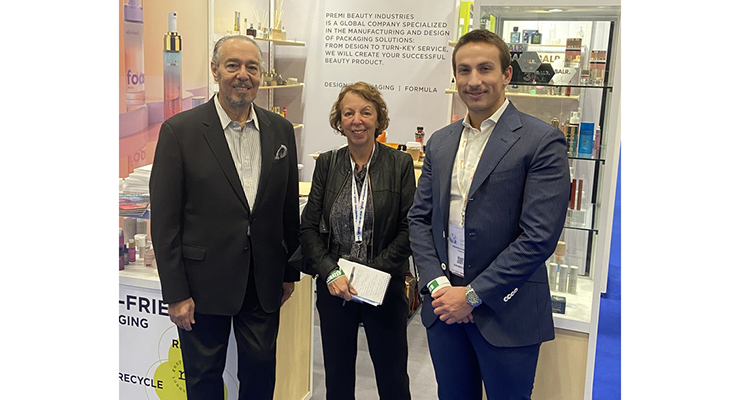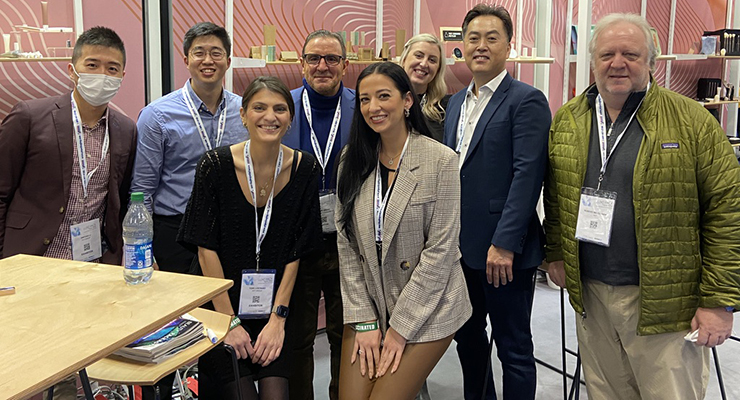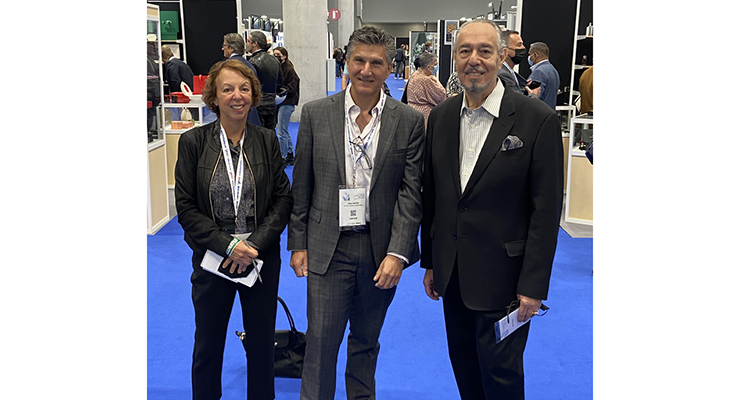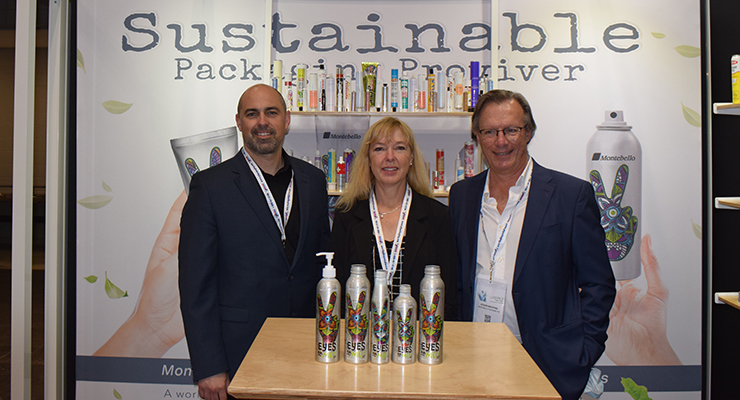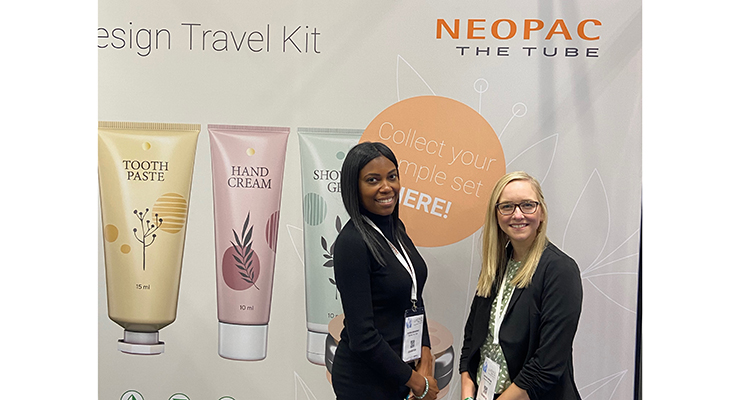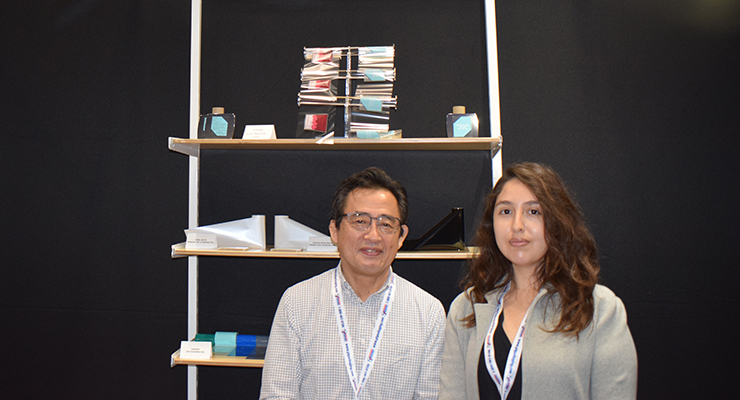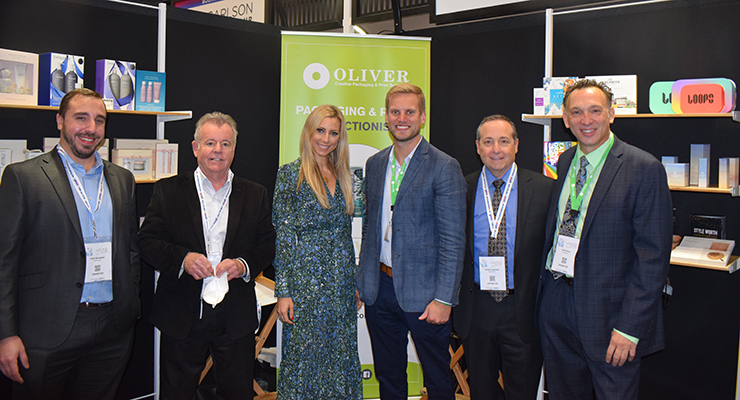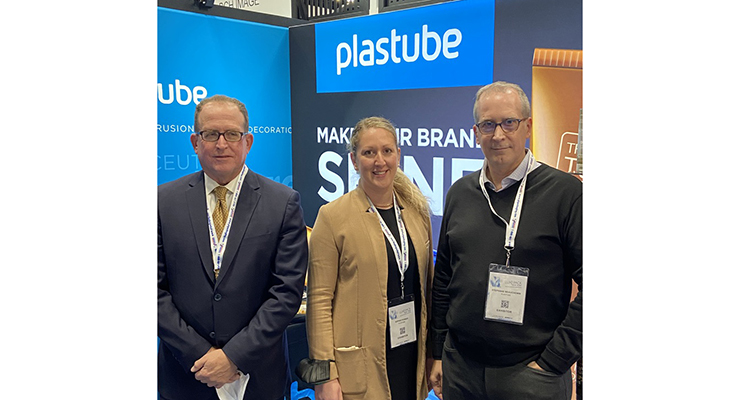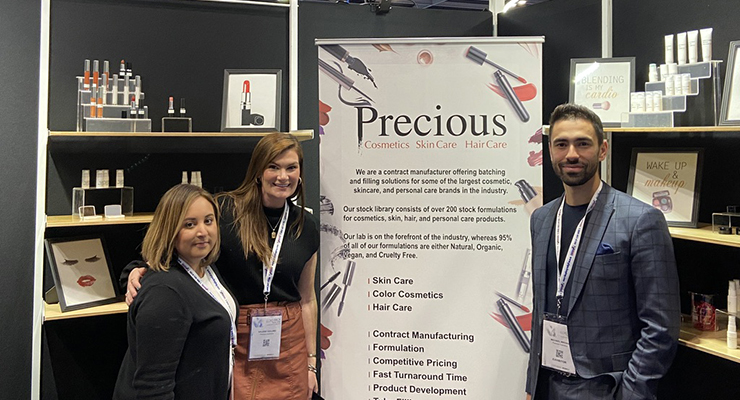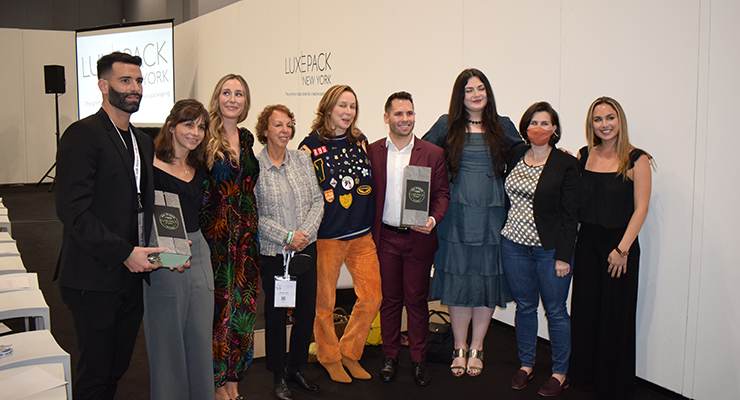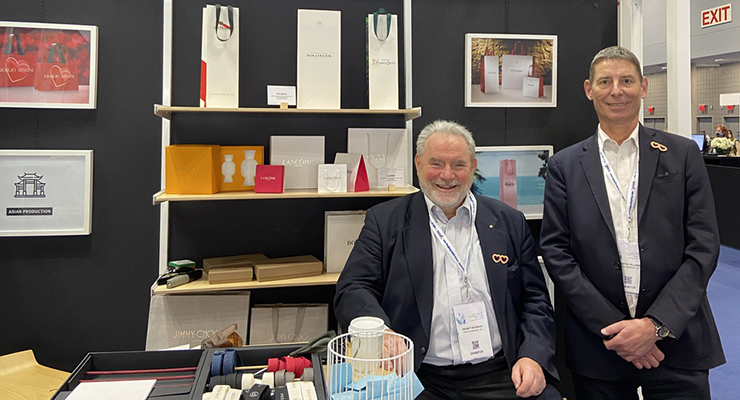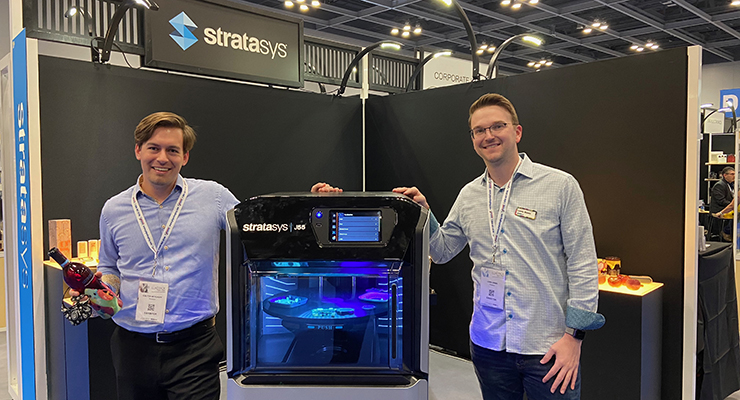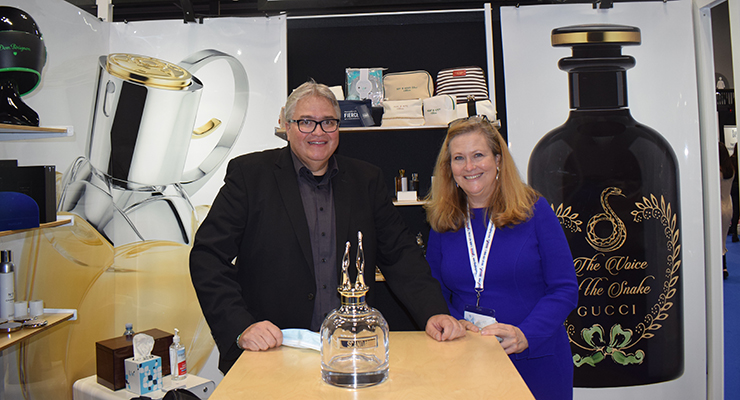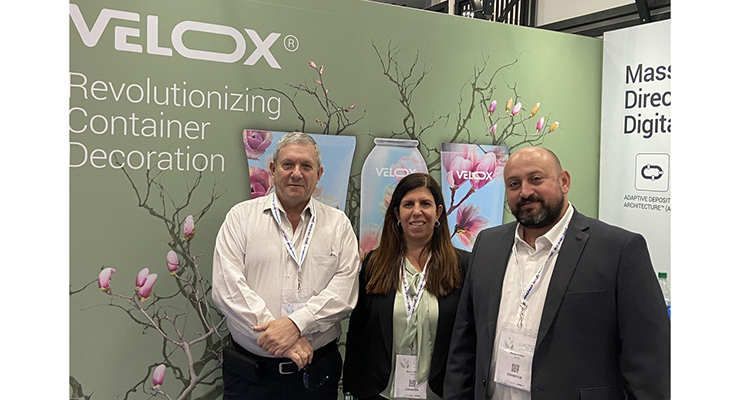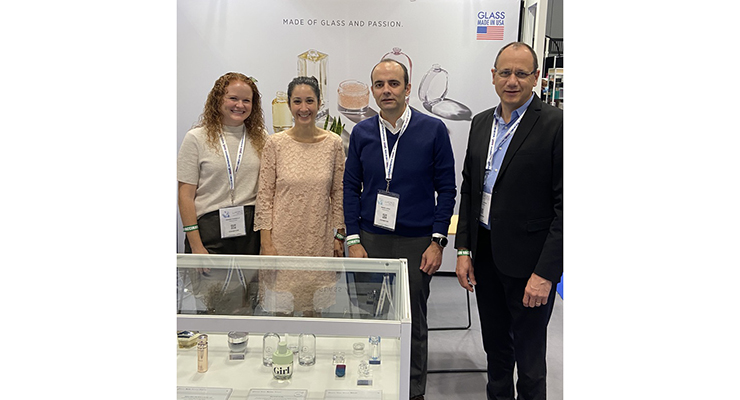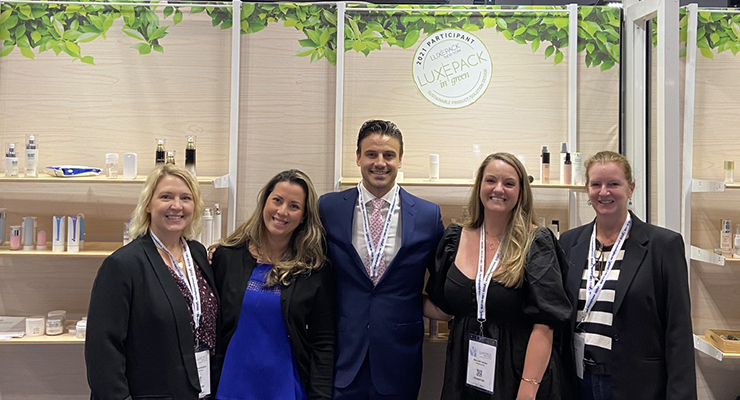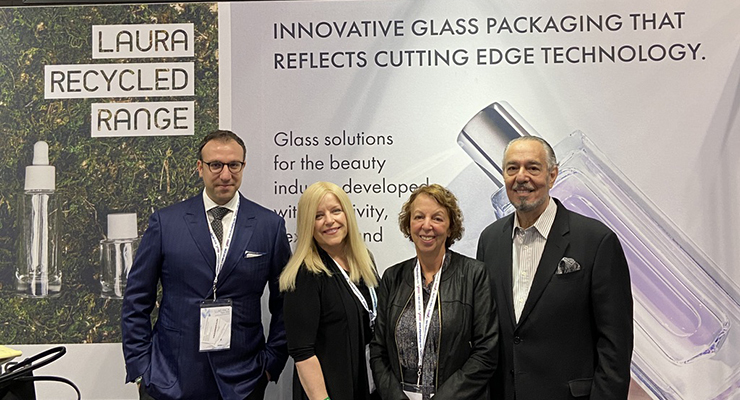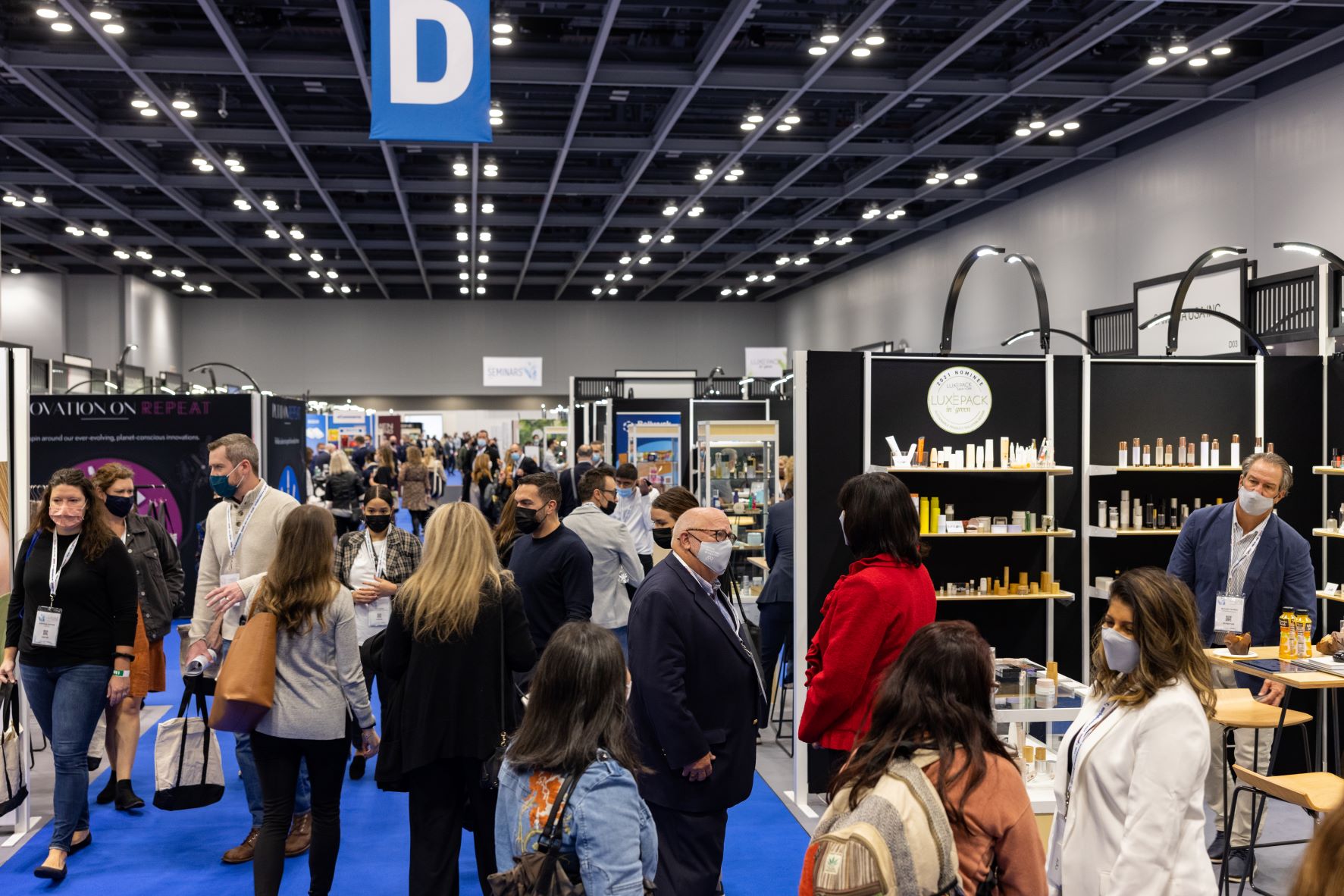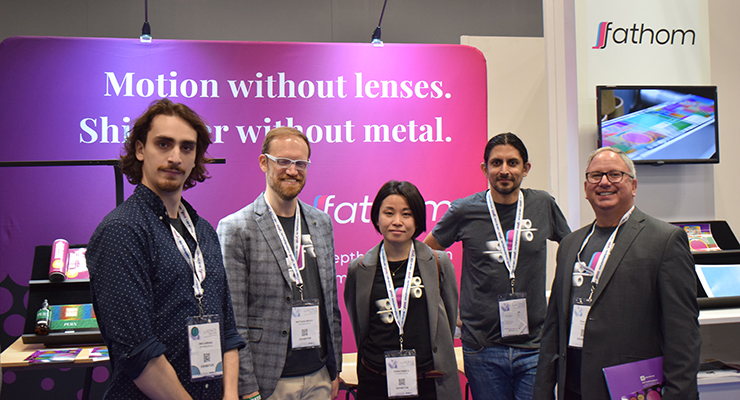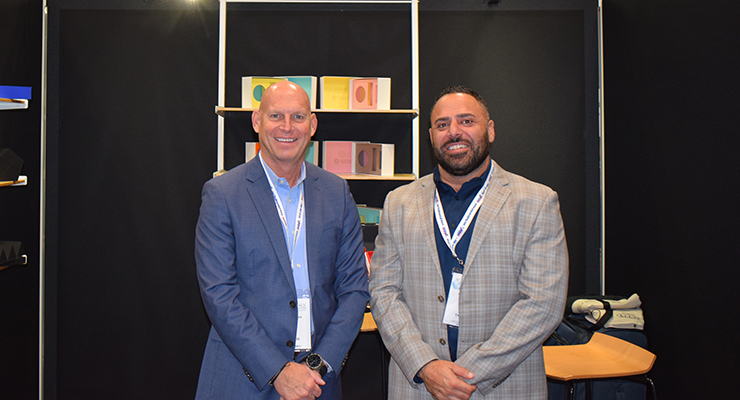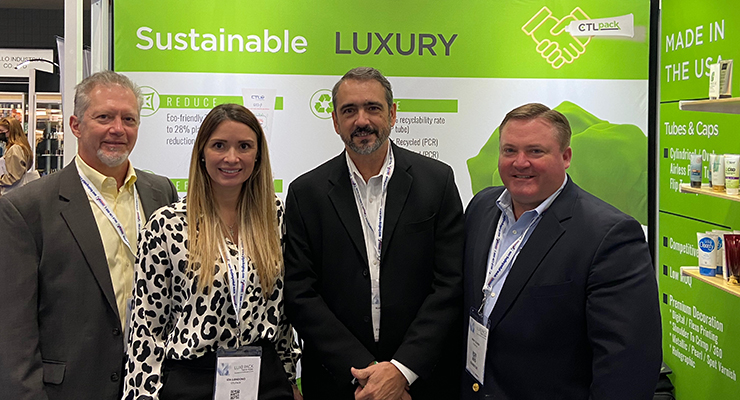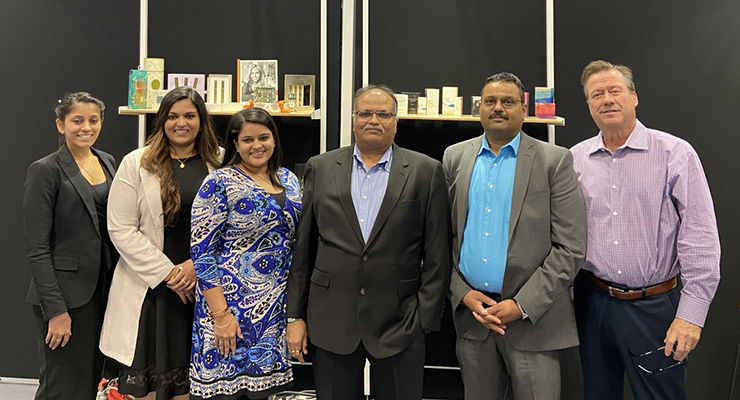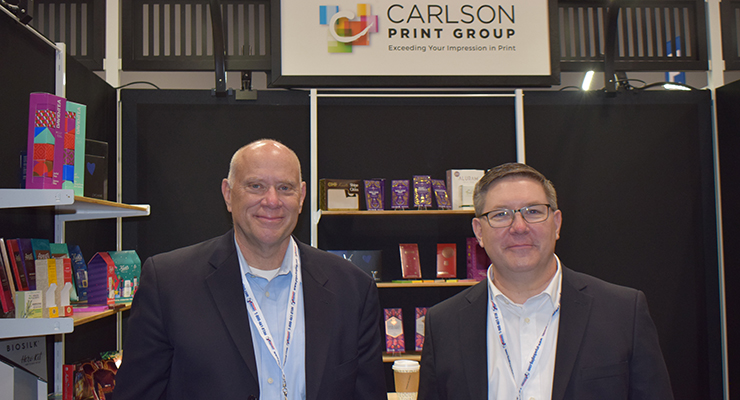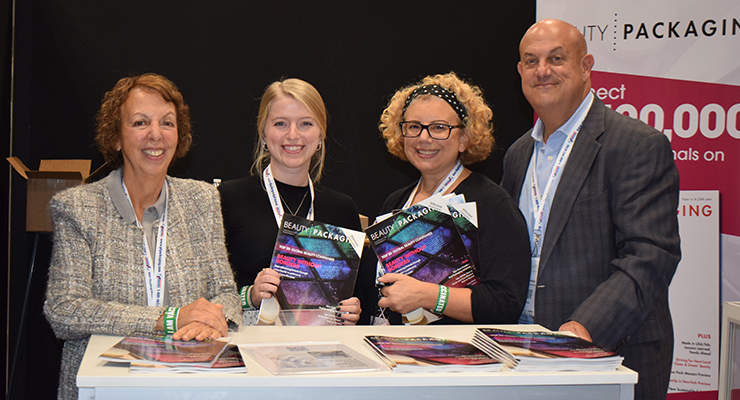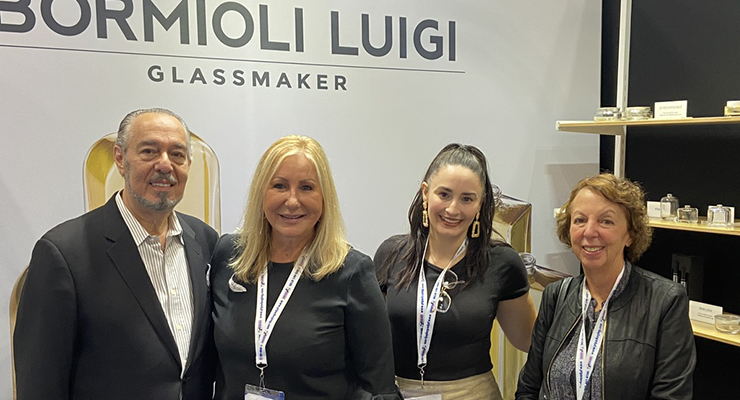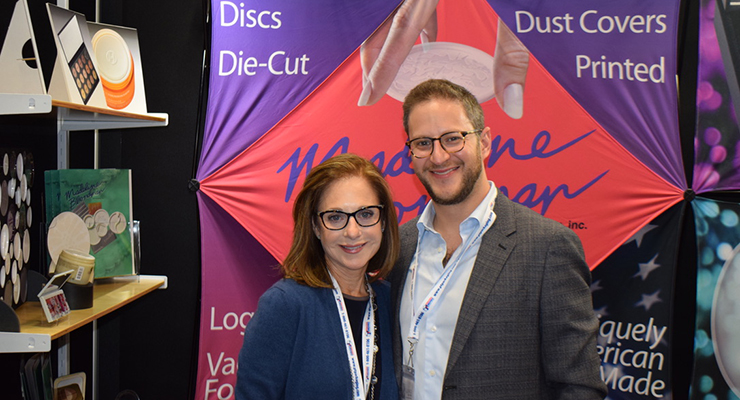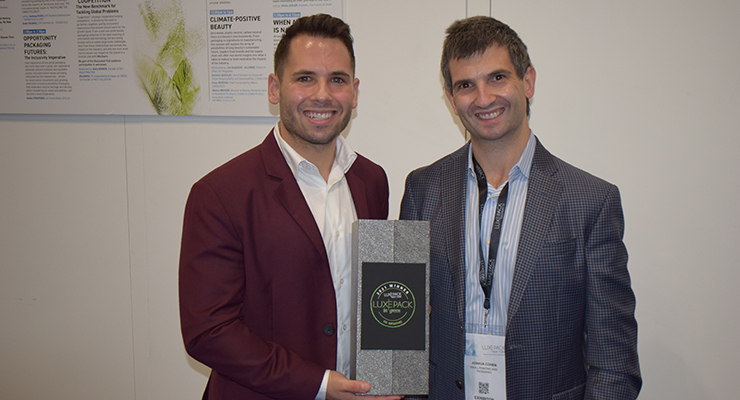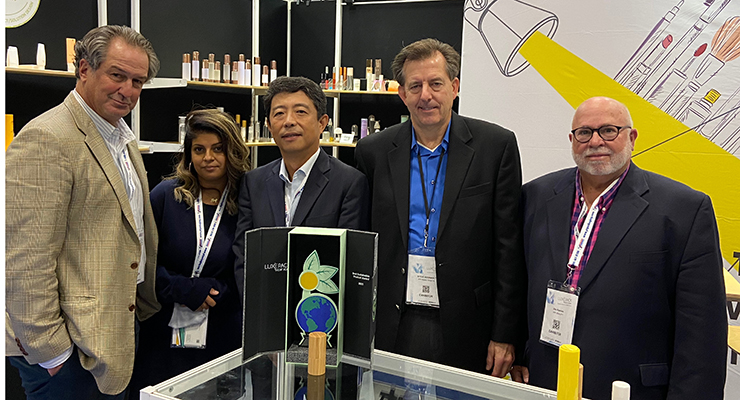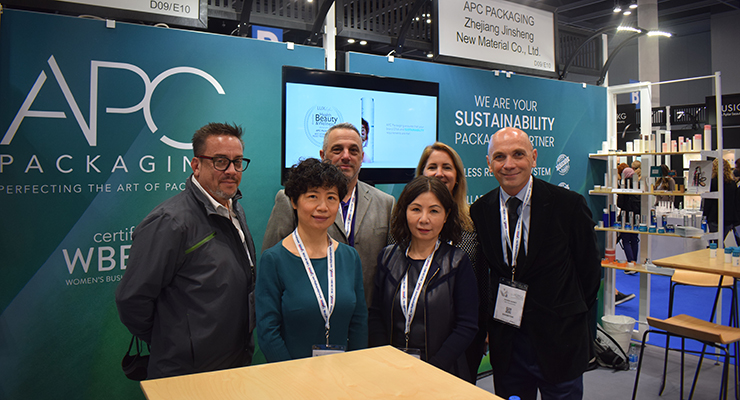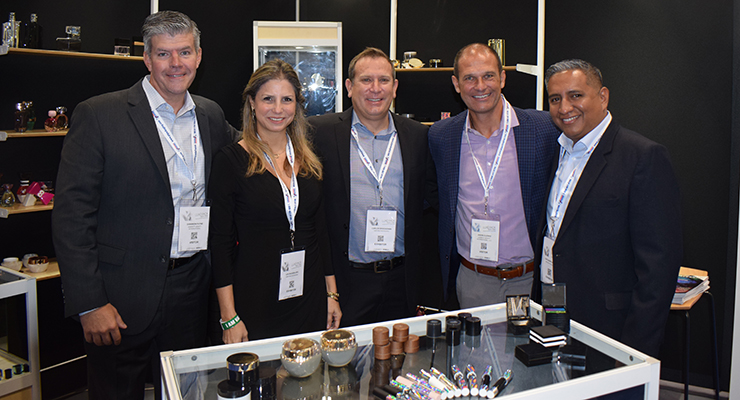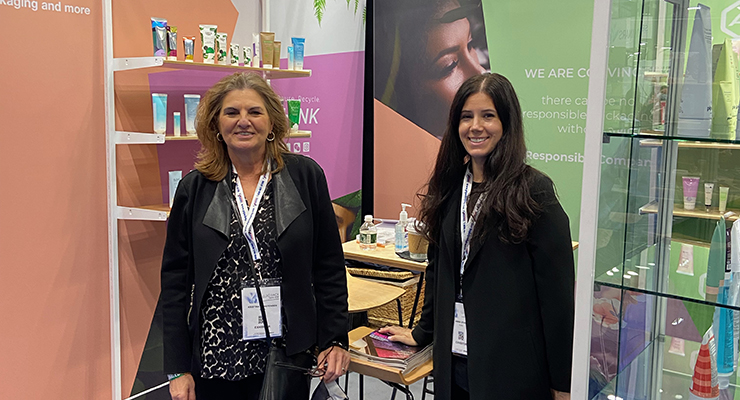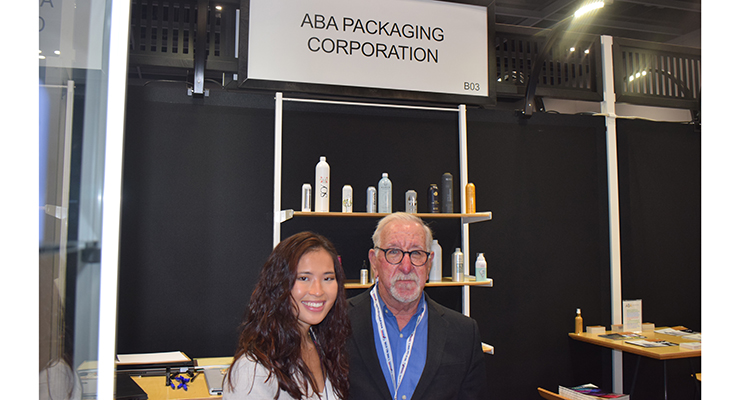Jamie Matusow, Editor-in-Chief12.02.21
Luxe Pack New York (LPNY) returned to Manhattan’s Javits Center on October 27-28 amid mandatory Covid-19 safety protocols that had been set in place. It was primarily a North American crowd of nearly 3,000 attendees and 160 exhibitors, as Europe and Asia still faced U.S. entry restrictions. However, a number of global companies were able to achieve a presence thanks to local representation in The Americas.
According to Linda Villalobos, marketing and communications manager, Infopro-Digital, managers of LPNY, “The Luxe Pack team was thrilled to reunite the luxury packaging industry and prove that nothing truly replaces the impact and value of in-person collaboration.”
Award-winning packaging designer Marc Rosen, who accompanied Beauty Packaging on a tour of the Javits’ show floor, commented, “The atmosphere was very upbeat as our industry colleagues were happy to re-connect after a long absence due to the pandemic.”
He added, “The show was well laid out with suppliers eager to display their newest offerings and ideas. Sustainability was the mantra, with makeup, skin care and fragrance components exhibiting paths toward achieving this goal with new materials or classic ones re-imagined. Pride was evident as suppliers showed their sustainable accomplishments for greener packaging to help the planet.”
In general, Rosen observed, “While most of the offerings were stock packaging, ideal for mass or niche lines, several suppliers were showcasing items that showed us how sustainability and luxury overlapped, such as handsome jars that looked custom and were refillable, caps made of wood and pulp cartons.”
On Day 2 of the show, Sari Sternschein, vice president, marketing and product development, Qosmedix, told Beauty Packaging that Day 1 had exceeded their expectations: “Our goal was 50 leads, and we got 130.” In addition to Qosmedix’s disposable applicator business, they continue to expand their expertise into the packaging side, with airless packaging, PCR airless jars, and much more. Qosina Corp. and its beauty division, Qosmedix, have recently been awarded a silver medal for corporate social responsibility and business sustainability from EcoVadis
Talk of Covid Difficulties
While attendees and exhibitors basked in getting back to face-to-face business, there was also much talk of Covid-related difficulties, including supply chain problems, power outages in China and labor shortages. Some suppliers we spoke with said that one trend they had seen over the past year or so was that brands had been stockpiling packaging in anticipation of inventory depletions. EcoVadis certification has also become a topic of conversation along with how difficult it is to achieve, and how some brands want to see its ratings extended throughout the supply chain.Sustainability Continues as Key Topic
As noted, sustainability—particularly relating to packaging and CSR initiatives—were top of mind for many of the exhibitors and attendees. With an array of sustainable offerings, from cartons using “new” materials, to recyclables to refillables, beauty industry suppliers have developed a wide range of options to meet brands’ and consumers’ needs in the wake of global environmental changes.No longer does a sustainable package look gritty or mundane; many of today’s options deliver a premium, eye-catching look, including several presented by upscale brands, including Chanel and Valentino. (For more on Luxe Meets Sustainability, please see Beauty Packaging’s feature article in the December 2021 issue, titled, ‘Innovative Packaging: Luxe and ‘Sustainable Without Compromise.’) Numerous sustainable options were also available for tubes, palettes, bottles, jars and cartons for all market points.
At Your ‘Full Service’
With a growing list of complicated decisions to be made by brands, regarding product development and production, especially in light of sustainability and supply chain, Full Service seems a more popular option than ever, and at LPNY, many exhibitors were speaking about their qualifications and the advantages of “one stop shopping.”HCT by kdc/one is a supplier that delivers full-service, end-to-end solutions overseeing design, engineering, manufacturing, formulation, filling and logistics.
At LPNY, HCT by kdc/one displayed a vast array of sustainable solutions, an entire section of solutions dedicated to their eco-modern approach (EMA) to sustainability, many of which are already in use by brands. The supplier’s 4 main pillars of sustainability include Designed For Recycling (DFR), which focuses on mono-material components, PCR (Post-Consumer Recycled) material, Bio-sourced material, and Refillable/Rechargeable components. Mono-material recyclable tin components include jars, palettes and compacts. A stock refillable tin jar looked particularly luxe.
Denis Maurin, head of global innovation and sales, HCT by kdc/one, told Beauty Packaging, “We are always looking for new materials that are sustainable but feel luxe. Combining materials that wouldn’t usually go together, like glass and paper, or metal and bioplastic, to reinvent concepts is what excites us and helps us push the limits of innovation. We are building the largest stock component library of eco-friendly options to help customers make the switch to more responsible packaging.”
The message at Cosmopak’s colorful booth was to have fun with makeup—and packaging. In this vein, they have just launched a line of 9 “mix-and-match” turnkey mascaras, taking one of the beauty industry’s most popular products, and making it easy for brands to get to market faster than ever before. Brands can tweak the PCR bottle, the brush and the formula to create their ideal combo. Available in any injected colors, the vial can be made in different shapes and sizes with a multitude of deco options.
Cosmopak also offers a large airless refillable collection, and options for jars and palettes. From a full turnkey perspective, Cassandra Boler, director of marketing, said, “Brands tell us what they want, and we source and provide the best option to fit their brand story.”
Yonwoo/PKG, a full-service packaging provider, operates on a three-prong approach of reduce, refill, recycle. Eric Csaszar, regional sales manager, told Beauty Packaging, as a supplier in the luxury tier where brands are also looking for sustainable solutions, they’re currently focusing on mono-materials and PCR as the best choices. They have also re-engineered their pumps by taking away the metal spinner and replacing it with a bellows that fits all airless packages. Larger bottles made of PET have also been popular, as in the U.S., bottles with a 2-in wide diameter can be recycled. Refillable glass bottles with an airless inner bottle made of recycled materials, is another option. In one model, only the bottom screws out.
A Flow of Refillables
While numerous suppliers offered full ranges of refillables, there was still discussion about consumers and retailers adopting the format. But many also are convinced that this is one of the likely paths moving forward. Some felt that slightly higher costs attached to recyclables would be justified by consumers, in exchange for “the positive impact on the environment.”ABA Packaging offered a full range of “endlessly recyclable” premium aluminum bottles that can be refillable, with the addition of a pump. Mono-material caps, and eco-friendly aluminum cans, jars and caps are also available; a full range of decorating options add to appeal. And Marchese says that the deco that ABA offers—from hot stamping to embossing—doesn’t prevent recycling efforts.” Another plus, according to Marchese: Their aluminum factory has not been impacted by supply chain problems.
Refills were also a hot topic at NF Beauty Group, where Alex Park, managing director of sales, said refills—and also springless and mono-material, bio resin and other sustainable materials— were getting lots of interest, as were NF’s glass refillables, “a luxurious concept in which you can keep the outer forever,” with the use of inserts. Park also showed us new solutions in color cosmetics packaging, including new rice husk technology for palettes.
Refillable—and single-use stick deodorants—have seen particularly strong demand over the past year.
Sternshein at Qosmedix, said, “People are obsessed with stick deodorant packages. They can also be used for sunscreens, makeup, foundation, masks and more.” Qosmedix offers a full range.
Along with their extensive range of IML tubes, Viva was showcasing their deo stick with a refill cartridge that uses 50% less plastic. The mono-material design uses up to 100% PCR plastic, and offers in-mold label decorating to make artwork “pop” with high definition, 360-degree coverage on barrel and cap, and options for special finishes. Plus, holographic, foils and velvet soft-touch finishes can make this stick package "irresistible," according to Melanie Gaudun, business development manager.
Dropping In
APC Packaging introduced their newest sustainable packaging innovation, the Mono-Material System Dropper and Bottle, which they say is “the first totally recyclable and patented dropper on the market.” The dropper and bottle can be recycled as one unit with Recycle Code 5. Other sustainable innovations on display included the Airless Refillable System, Refillable Jar and Mono-Material Jar and Cap Series.Tube Newness
Albéa, which serves customers from global to regional and domestic, showcased a wide variety of Made in USA sustainable tubes (the company operates three factories in North America and also has regional R&D teams). Kristina Christensen, vice president, sales, Albéa North America told Beauty Packaging that sustainable luxury gives customers lots of options along with the opportunity to educate brands on how they can incorporate sustainable tubes into their marketing strategy. For instance, (Re)flex tubes are metallized tubes that contain enough HDPE materials to be recycled. Generation 2 will be able to be recycled with plastics. In addition, many beautiful PCR tubes contained content ranging from 34% to 43%.The Metamorphosis range of tubes reduces the amount of plastic used by taking standard brown Kraft paper and combining it with the plastic. Albéa’s three key pillars of its sustainable tubes strategy are weight reduction, recyclability and integration of PCR.Neopac highlighted a number of sustainable tubes including a recycled tube with 64% PCR content; Lightweight Polyfoil MMB tubes with 30% weight reduction in the tube body; a Sugarcane Tube, made from renewable raw materials and offering the same characteristics and processability as fossil-based polyethylene; and the PICEA Tube, comprised of 95% renewable material in the tube body and shoulder. The company also featured its recently introduced mono-material barrier tubes, and spoke about its near-future plans for a tube line at its U.S. manufacturing facility dedicated to serving the cosmetics and oral care sectors.
At Canada-based Plastube, Stéphane Beauchemin, vice president of sales and marketing, said they have gained a lot of traction with their digitally printed tubes which are ideal for short lead times, and they are working on improving their digital gloss feature. Digitally printed tubes have an MOQ of 5,000. The company has also seen demand for their tubes made of ocean-bound plastics, as well as tubes made with up to 100% PCR. Beauchamin told Beauty Packaging that he has also noticed a trend in some brands bringing production back from China.
Tubex is an Austrian company that says they produce 1.6 billion aluminum tubes annually—with a variety of sustainable options. Their Blue Tube Evo uses a specially developed alloy that closes the material loop by incorporating aluminum packaging waste from end consumers, explained Thierry Bitout, Group CEO. They work with many brands, including high-prestige ones, on 100% PCR and PIR recyclable aluminum tubes—that are lightweight, using “15% less materials,” and causing less CO2 emissions. The company collects its own aluminum from various sources, and plans to start collecting the tubes from brands, and recycling those as well. Tubex also provides 100% aluminum mono-tubes for sachet samples or single-use purposes.
Based in Spain, but with a long-standing factory in North Carolina, CTL Packaging specializes in injection molded (IML) tubes. Andy Olsen, vice president sales & marketing, CTL Packaging USA, told Beauty Packaging that IML offers premium deco, flexible MOQ’s at 5,000 per SKU. He said their most sustainable tube is polypropylene-based, mono-material—and PCR can be added for a more sustainable story.
Glass on An Upswing
At Bormioli Luigi, Olga Bursac, vice president sales and marketing, commented that fragrance is doing “phenomenally well in Europe,” noting especially the new Arianna Grande launch. Other fragrance bottle standouts from Bormioli Luigi: Oscar de la Renta and L’Oreal’s Tommy. The Tommy Hilfiger fragrance is available in three sizes. When you open the cap, a sampler slides out so you can easily take it along with you. Bursac also noted that gold and rose gold caps are “coming back.”One of Premi’s newest caps is made of 40% recycled surlyn. The Italian company, with offices in the U.S., also showcased an airless refill in a glass shell, rather than a typical acrylic all glass and PP package. The supplier now offers matching refillable jars to match. The refills can be decorated as well as the outer parts. Refills with pumps prevent contamination issues. Refills are also available in travel size. Another range of bottles is made in green PE.
At Coverpla, Gilda Mirra Cutri, vice president of operations and business development, told Beauty Packaging that they are continuing to add more fragrance and skin care packaging to their offerings. One sustainable option is using up to 60% PCR for some of their stock skin care and fragrance bottles and jars. Many of the other models can be produced at about 20% PCR, and can be combined with many of their different stock caps.
Zignago Glass USA, with several plants in Italy and Europe, and a sales office in Miami, presented a range of products for cosmetics and fragrance packaging. At LPNY, the Group featured a variety of offerings for cosmetics and perfumery, including customizable products with second processes and accessories, which comes from “a deep ecological culture—because sustainability and circular economy are founding values of the entire company strategy.” Zignago has worked with Brosse on some innovative new bottle shapes and weight distributions; and with Eurovetrocap on bottles with 60% PCR glass and 30% internal cullet. QR codes are used to inform the consumer of the sustainable story behind the product. Recyclable jars can be sprayed so you don’t see the pod inside. Zignago is also making their own PCR pellets for glass.
Paper and Pulp
At Oliver, there’s been a huge focus on sustainability and Doug Doroh, vice president of sales and marketing, Oliver Inc., said, “Business is up significantly and we’re looking at acquisitions.” Tree-free board, using 100% sugar cane bagasse has been very popular. In a sign of the times, the company has seen an increase in new business in packaging for face masks. For instance, Oliver worked with Batallure Beauty to create unique, “shapely” packaging for the Loops brand face mask boxes.At Eska, the emphasis was on Eska Colors, a sustainable, luxe offering in which secondary packaging cartons are printed directly on solid color boards colored all the way through not wrapped, and featuring a continuous colored edge. Eska also converts waste to product and energy—using recycled paper to make the board as well as using waste to power their manufacturing facility in The Netherlands, for a closed loop system. A carton made of 15% jeans fiber, the remainder other recycled fibers, was particularly appealing.
At Knoll Packaging, Ben Cohen, creative and innovation director, said, “We feel sustainable packaging innovation is the greatest single driver in the industry. The supplier is focused on producing 100% mono-material recyclable luxury packaging, including Knoll Ecoform molded pulp and KnollLuxe Premium Board Platforms in the luxury market, recently adopted by both Chanel (100% Knoll Ecoform clamshell and Chanel’s first-ever advent calendar, in molded pulp) and Tom Ford (KnollLuxe Premium Board recyclable Platforms incorporated into their holiday sets).
Procos has been designing quality luxury packaging for brands since 1998, including exclusive eco-friendly shopping bags, fully customizable and practical gift boxes and shipping cases for retail and e-commerce. At Luxe Pack New York, Procos highlighted a 100% mono-material e-commerce box that they say is “practical, functional, space-saving, user and eco-friendly.” The supplier’s new concept "YOGA Light" is a new asset in e-commerce shipping, and can also be used in gift boxes for retail.
Deco-mania
With decorative effects hotter than ever, North Pacific International (NPI) introduced some of their new features for foil and heat transfer labels at LPNY. Options include: Biomass construction for eco-friendly solutions; glitter-incorporated foil; segregated matte/gloss; piano black & white for opacity; and glass decoration.At TNT, known for their luxe deco, Boris Schaeffer, showed us some of their latest projects—and a new line of makeup bag accessories. Despite Covid, he said, “This year has been good—and so is the outlook for 2022—globally and in the U.S.”

